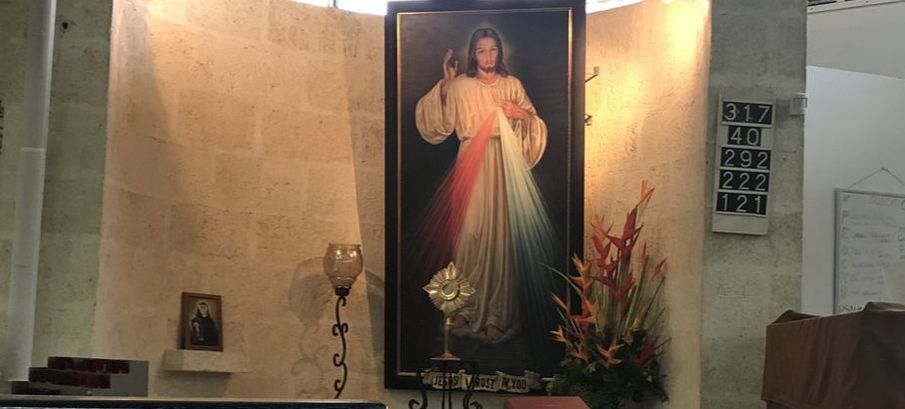The Feast of Divine Mercy
Divine Mercy Sunday (also known as the Feast of the Divine Mercy is celebrated on the Sunday after Easter. It is originally based on the Catholic devotion to the Divine Mercy that Saint Faustina Kowalska reported as part of her encounter with Jesus, and is associated with special promises from Jesus and indulgences issued by the Church.
The feast of Divine Mercy, as recorded in the diary of Saint Faustina, receives from Jesus himself the biggest promises of grace related to the Devotion of Divine Mercy. In specific, Jesus said that a person who goes to sacramental confession (the confession may take place some days before) and receives Holy Communion on that day, shall obtain the total forgiveness of all sins and punishment. That means each person would go immediately after death to heaven without suffering in purgatory (or hell). Additionally, the Roman Catholic Church grants a plenary indulgence (observing the usual rules) with the recitation of some simple prayers.
Devotion to the Divine Mercy
Faustina Kowalska, a Polish nun reported visions and visitations from Jesus and conversations with Him. He asked her to paint the vision of His Merciful Divinity being poured from His sacred heart and specifically asked for a feast of Divine Mercy to be established on the first Sunday after Easter so mankind would take refuge in Him.
699: I want to grant a complete pardon to the souls that will go to Confession and receive Holy Communion on the Feast of My Mercy.
Divine Mercy Sunday is also the day after the culmination of the novena of the Chaplet of Divine Mercy. Faustina wrote Jesus instructed her that the Feast of Mercy (the Sunday after Easter) be preceded by a Divine Mercy Novena which would begin on Good Friday.
The devotion was actively promoted by Pope John Paul II. On April 30, 2000, the Canonization of Faustina Kowalska took place and the Sunday after Easter was officially designated as the Sunday of the Divine Mercy in the General Roman Calendar. On April 22, 2001, which was one year after establishing Divine Mercy Sunday, Pope John Paul II re-emphasized its message in the resurrection context of Easter:
Jesus said to St. Faustina one day:
Divine Mercy! This is the Easter gift that the Church receives from the risen Christ and offers to humanity.
Plenary Indulgence
In June 2002, John Paul II granted indulgences to Catholics who recite specific prayers on that day, which were then formally decreed by the Apostolic Penitentiary. The priests are also ordered in that day to lead the prayers in honour of Divine Mercy, inform the parishioners about the Divine Mercy, and hear confessions.
We are privileged to have a very special Icon of The Divine Mercy in our church and to be designated as THE NATIONAL SHRINE OF DIVINE MERCY!
Let us do our best to be a part of this very special TRIDUUM to promote this very important Devotion. Encourage your family and friends to attend the special Mass at 3.00 pm on the Feast of Divine Mercy.
Plenary Indulgence
In June 2002, John Paul II granted indulgences to Catholics who recite specific prayers on that day, which were then formally decreed by the Apostolic Penitentiary. The priests are also ordered in that day to lead the prayers in honour of Divine Mercy, inform the parishioners about the Divine Mercy, and hear confessions.
We are privileged to have a very special Icon of The Divine Mercy in our church and to be designated as THE NATIONAL SHRINE OF DIVINE MERCY!
Let us do our best to be a part of this very special TRIDUUM to promote this very important Devotion. Encourage your family and friends to attend the special Mass at 3.00 pm on the Feast of Divine Mercy.



